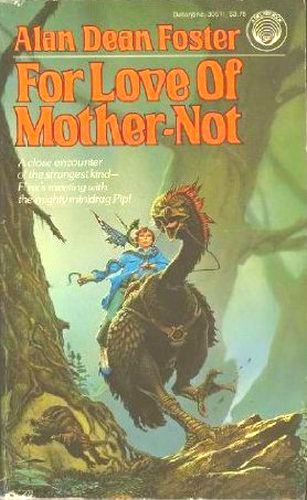

|
| Cover art by Michael Whelan |
| FOR LOVE OF MOTHER-NOT Alan Dean Foster New York: Ballantine Books, March 1983 | Rating: 5.0 High |
|||
| ISBN-13 978-0-345-30511-4 | ||||
| ISBN-10 0-345-30511-6 | 247pp. | SC | $2.95 | |
Readers familiar with the adventures of the human going by the name Flinx and the obscure nature of his origin will have picked up hints that some soft of genetic intervention is involved. This is the book wherein the nature of that intervention is explored.
Suffice it to say that an organization of genetic scientists calling themselves the Meliorare1 Society had manipulated the genomes of a number of children with the aim of improving humanity. The Commonwealth authorities had taken exception to their secret experiments and started rounding them up. Now the Society, reduced to only a handful of members, desperately seeks to recover its former charges in hopes of demonstrating a favorable outcome. One of their operatives has located "Number 12" on the backwater planet Moth. Number 12 is Flinx, himself knowing little about his origins.
The chamber in which the three of them worked was situated in a small, nondescript office building located in an unimportant city on a backwater world. For all that the equipment they hovered over had a cobbled-together appearance, most of it was still of a type requiring enormous expertise to operate and great expense to fund. Both the knowledge and the money came from scattered, seemingly unrelated locations throughout the Commonwealth. To the men and women who practically lived in the room, isolation was their honored burden, obscurity their most potent weapon. For they were members of a uniquely despised and persecuted minority at war with the tenets of civilized society. Truly were their hearts pure and their purposes of noble mien—it was just their methodology that the rest of civilization questioned. *
* * Their aim was nothing less than the improvement of mankind in spite of itself. That their methods might result in damage to the innocent was something they had known from the beginning. They had put that and other conventionally moral beliefs aside, believing that such sacrifices were necessary that the majority might benefit. They called their group the Meliorare Society an innocent-sounding name drawn to mask the intention of improving humanity via the artificial manipulation of genetic material. – Page 37 |
The story involves Flinx being adopted by an old woman, for reasons she is unable to fathom. In due course a team from the Society arrives on Moth and tries to regain control of Flinx. Quite willing to use extralegal methods, they still must be cautious — not only to evade arrest but to avoid stirring dangerous powers in their former subject, powers even he might not be aware he possesses.
They decide to kidnap the old woman and use her as the means of controlling Flinx. He, of course, undertakes to chase them down. The pursuit features the typical elements of a Foster tale: stealthy reconnoitering, some mayhem, and plenty of exotic native animals. Also, Flinx meets and bonds with Pip, a creature from off-world that turns out to be an Alaspinian miniature dragon. Foster keeps the nature of Flinx's powers suitably obscure, and he avoids the hyperbolic writing that mars at least one other of his novels. The result is a satisfying adventure that I rate at the top.

 To contact Chris Winter, send email to this address.
To contact Chris Winter, send email to this address.